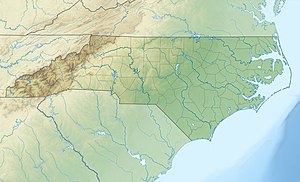Scotchman Creek (Deep River tributary)
| Scotchman Creek Tributary to Deep River | |
|---|---|
| Location | |
| Country | United States |
| State | North Carolina |
| County | Moore |
| Physical characteristics | |
| Source | Buffalo Creek divide |
| • location | about 1 mile northwest of Parkland, North Carolina |
| • coordinates | 35°26′23″N 079°30′43″W / 35.43972°N 79.51194°W[1] |
| • elevation | 420 ft (130 m)[2] |
| Mouth | Deep River |
• location | about 2.5 miles southeast of High Falls, North Carolina |
• coordinates | 35°28′01″N 079°29′12″W / 35.46694°N 79.48667°W[1] |
• elevation | 260 ft (79 m)[2] |
| Length | 3.10 mi (4.99 km)[3] |
| Basin size | 5.33 square miles (13.8 km2)[4] |
| Discharge | |
| • location | Deep River |
| • average | 6.56 cu ft/s (0.186 m3/s) at mouth with Deep River[4] |
| Basin features | |
| Progression | Deep River → Cape Fear River → Atlantic Ocean |
| River system | Deep River |
| Tributaries | |
| • left | unnamed tributaries |
| • right | Lick Creek |
| Bridges | Spence Road, NC 22 |
Scotchman Creek is a 3.10 mi (4.99 km) long 2nd order tributary to the Deep River in Moore County, North Carolina.
Course
[edit]Scotchman Creek rises about 1 mile northwest of Parkland, North Carolina in Moore County and then flows northeast to join the Deep River about 2.5 miles northwest of High Falls, North Carolina.[2]
Watershed
[edit]Scotchman Creek drains 5.33 square miles (13.8 km2) of area, receives about 48.1 in/year of precipitation, and has a wetness index of 396.73 and is about 73% forested.[4]
See also
[edit]References
[edit]- ^ a b "GNIS Detail - Scotchman Creek". geonames.usgs.gov. US Geological Survey. Retrieved 21 August 2020.
- ^ a b c "Scotchman Creek Topo Map in Moore". TopoZone. Locality, LLC. Retrieved 21 August 2020.
- ^ "ArcGIS Web Application". epa.maps.arcgis.com. US EPA. Retrieved 21 August 2020.
- ^ a b c "Scotchman Creek Watershed Report". US EPA Geoviewer. US EPA. Retrieved 21 August 2020.


 French
French Deutsch
Deutsch
